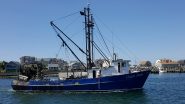CRC
1 February 2019
Aug 18-21: Conference on Fisheries and Coastal Environment in Accra, Ghana ...read more1 November 2018
Nov 8: CRC to host RIMTA’s Annual MeetingCRC will be hosting the RI Marine Trades Association’s annual ...read more25 October 2018
Nov 8 and Nov 9: Game of FloodsCRC is teaming up with Providence, RI Emergency Management Agency – ...read moreThe main objective of the training was to provide participants with advanced skills in GIS, Remote Sensing and GPS data collection strategies for the effective planning and decision making relative to the management of coastal resources.
read moreThis document is aimed at providing the status of the small pelagic fish resources in Ghana, through consultation with the Scientific and Technical Working Group (STWG) of the USAID/Sustainable Fisheries Management Project (SFMP). The information contained in this document has been obtained from the Fisheries Scientific and Survey Division of the Fisheries Commission of Ghana and other available information. The current fishing effort seems to be well beyond the level of sustainability for the small pelagic stocks. In the absence of effort control measures, stocks will continue to decline with diminishing economic returns leading to further deterioration of social conditions. The Fisheries Commission began addressing this situation with the support of the World Bank by registering small artisanal canoes. The semi-industrial and the industrial fishing vessels have been subject to an annual registration and licensing requirements. Furthermore, it is expected that the canoe registration will be followed by a program of licensing and ultimately an implementation of effort control program in the artisanal fishery.
read more Rhode Island Blue Economy
read more
Rhode Island Blue Economy
read more
Child Labor and Trafficking (CLaT) is a major global problem that governments, civil society and development partners show grave concern about because of its devastating impact on society. The ILO's 2008 estimates asserts that about 60 percent of the 215 million boys and girls engaged in child labor occur in the agricultural sector (including fishing, aquaculture, livestock and forestry) while UNIDOC reports that a total of 161 countries are identified to be affected by human trafficking by either being a source, transit or destination country. US Department of State data indicates that an estimated 600,000 to 820,000 men, women and children are trafficked across international borders yearly, with approximately 50 percent being minors.
read moreThe research intended to provide insights into the financial and technical feasibility of producing healthy fish for the Ghanaian market by: Identifying available market for healthy fish. Determining the percentage of fish processors, traders and consumers who were aware of the implications of smoked fish. Identifying what clients, consider when purchasing smoked fish. Identifying the factors necessary for the production of a healthy smoked fish. Determining the percentage of fish processors who are willing to change ways of processing fish to make it healthier. Identifying some push factors and conditions that would be considered by fish processors before producing healthy fish. Determining the percentage of consumers who are willing to pay more for healthy smoked fish.
read moreSNV has worked closely with the Ministry of Fisheries and Aquaculture Development (MOFAD), the Fisheries Commission (FC), Ghana Standards Authority (GSA), Food Research Institute (FRI), and other stakeholders to develop the improved Ahotor oven. This oven improves upon traditional methods of smoking fish, which have been found to raise health and environmental concerns for both the fish smoker and consumer. For instance, the continuous exposure to smoke triggers asthma and causes cancer in some cases while the smoked fish also contain PAH levels that are well above those recommended for human health, with the widely used Chorkor oven producing PAH levels 7-10 times above the EU standard. Despite the benefits presented by the Ahotor oven, its uptake among fish processors has been marginal. The objective of the Market Development and Financing Strategies, is to lay out the factors that are impeding the adoption of the oven – including constrained enabling environment, weak supply chain, and a lack of consumer awareness – and outline strategies to address them, including effective financing methods.
read more